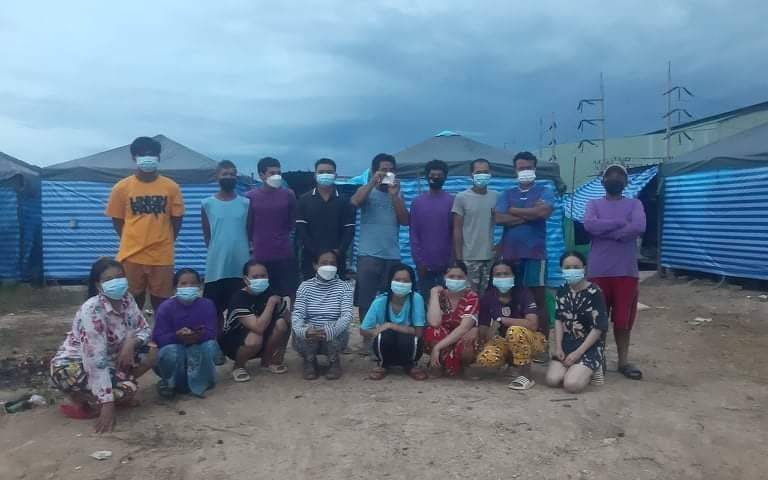After three months without work at a construction site in Thailand’s Nakhon Pathom province, Mith Sara says he has started fishing in the streams for food.
Sara, 44, and his wife say they’re legal migrant workers with passports and proper work permits, but the company he works for, which builds public buildings like schools and pagodas, stopped its work. Sara claims 50 or 60 percent of migrant construction workers in the province had been affected by the job losses caused by Covid-19.
“We are struggling a lot when we do not have work, face a shortage of food and the coronavirus surrounding us,” he said. “We’re also thinking of our homeland and rice field. [We] want to go back.”
With their rice running low, they appealed to the company that employed them for help, receiving nothing but a promise of a Thai social security card, Sara said. What Sara would really like is to return to his four children in Siem Reap province, but he worries about getting stuck in a quarantine center on the Cambodian border, which are inundated with returning workers.
“I have no idea where [we should] go. I want to go ahead, but I’m unable. Going back I’m also unable,” he said of traveling to Cambodia or finding work again in Thailand.
Whether they have the virus or not, Cambodian workers in Thailand say they’re struggling as Covid-19 surges at construction sites and other workplaces packed with migrant laborers.
Nearly 9,000 Cambodian workers in Thailand have been infected with Covid-19 since widespread transmission began in April, said Central’s Thailand-based project officer Leung Sophon, citing a report from Thailand’s Health Ministry.
Sophon called the situation “extremely worrying,” as tens of thousands of others were stuck in “red zones.” Thailand put Bangkok and five provinces under its strictest “dark red” Covid-19 measures, which include a curfew, limited business activity and the closure of all construction sites and a freeze on travel for migrant workers, according to Thailand’s Tourism Authority.
Throughout June, Covid-19 spread through the construction sites in Bangkok’s outskirts and neighboring provinces where migrant workers are employed, Sophon said. And early last week, outbreaks started in communities of foreign manufacturing workers, including Cambodian, Burmese and Laotian nationals in provinces surrounding the Thai capital, he said.
“The workers who are in need are really struggling. [I] do not know at what level [the need] is, but there are a lot of worries,” he said. “Most of them want to return home but do not know how to return. On the other hand, if they go back to Cambodia, they will be put in quarantine centers along the borders. … If they go, they are afraid of bringing the disease to infect in Cambodia.”
The Thai government also imposed a lockdown from 9 p.m. to 4 a.m. in four provinces, with warnings there may be a nationwide lockdown, Sophon said, while health authorities advised that patients with mild symptoms should stay at home.
For Cambodian construction workers like Sara, the lockdown in Thailand threw them into an immediate food crisis, with donations from the Cambodian Embassy and NGOs only reaching some of the workers in need. Central’s Sophon said he received phone calls every day seeking help, with some saying they tried and failed to contact the Cambodian Embassy for assistance.
“Now, in some places, they are lacking food and they are infected, but they do not have any medicine, not even at construction worker camps,” he said. “They contacted me and asked me to intervene to get them out of that place because there are infections, but there was no hospital or doctor or boss to help them.”
VOD could reach neither the Thai Embassy in Phnom Penh nor Cambodian Foreign Ministry spokesperson Koy Koung on Monday.
Koung previously said there were about 1 million Cambodian workers in Thailand, but Central estimates that figure is 1.6 million.
A Couple’s Plight
When dozens of Cambodian workers at a sewing machine assembly plant in Chonburi province caught Covid-19, Chhon Sap and her husband, Nut Hoeung, were also infected. But the couple was split up — Sap was taken to a military camp in Chonburi, while her husband was taken to a state hospital.
Speaking by phone, Sap, 37, said she was staying in a large room, like a classroom, with other Covid-19 patients.
“There are a lot, uncle. There are many of our Khmer, more than 100,” she said. “There are mixed [nationalities], uncle, both Khmer and Burmese, male by male, female by female. A lot.”
She said she was not sure how she became infected, but she developed a cough and fever and reported for a Covid-19 test almost one week ago.
Her husband, Hoeung, was sent to a state hospital because he has some issues with his lungs, with his symptoms including cough, fever, diarrhea, nausea and shortness of breath, Hoeung said. The only Cambodian among local patients at the state hospital, he had some communication troubles with the doctors but they treated him very well.
Hoeung is feeling better after receiving medication, and is now able to eat porridge. But the virus has left him weak and likely unable to return to factory work, he said.
“I want to go back home too, because I am tired quickly so that [I am] afraid I will no longer be able to work,” he said. “After I recover, I will decide to ask permission from my boss to return home, but I’ll wait until I recover first.”
Meanwhile his wife, Sap, said she was feeling better, but she worries about her future: whether she can return to the factory or to her home in Tbong Khmum province.
“I am always worried about the future. We do not know what to do as we have no money. [We] have only to endure.”












